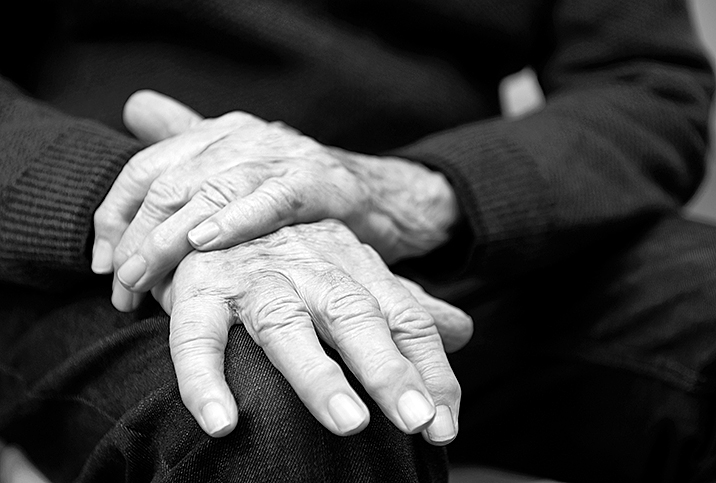How Do Hormones Affect Arthritis?

Many people with arthritis, a majority are women, experience worse symptoms during certain hormonal phases and relief during others. Significant transitions can even coincide with disease onset.
More research is needed to fully comprehend the link, but understanding common patterns can help you prepare and cope.
Why are women more susceptible to arthritis?
Women undergo countless hormonal fluctuations throughout a lifetime, from the ebbs and flows of monthly menstruation to pregnancy and menopause.
While these shifting hormone levels produce myriad symptoms, they can also influence underlying health conditions such as arthritis, a group of diseases that affects about 1 in 4 adults in the United States, per the Centers for Disease Control and Prevention (CDC).
Females are about twice as likely to develop autoimmune diseases, including inflammatory arthritis, compared to males, said Monte Swarup, M.D., an OB-GYN in Chandler, Arizona, and the founder of HPV Hub.
Inflammatory arthritis is one of two categories of arthritis, with the other being osteoarthritis. Whereas the former is caused by autoimmunity, the latter results from joint wear and tear or trauma. There are more than 100 types of arthritis, most of which are autoimmune-related.
Why hormones may play a role in arthritis
Scientists aren’t sure why women are so much more susceptible to arthritis than men. Most theorize a combination of genetic, environmental and hormonal factors contribute, according to a 2020 review.
The X chromosome—women have two, men only one—contains far more immune-associated genes. As a result, there’s a significantly higher potential for mutations that could contribute to autoimmunity.
Additionally, sex hormones such as estrogen and progesterone influence immunity and immune system response. However, the mechanisms through which they do so—and the ultimate effects—aren’t quite clear, according to Caroline H. Siegel, M.D., a rheumatology fellow at the Hospital for Special Surgery in New York City.
For example, some lupus research has demonstrated estrogen may exert a pro-inflammatory effect, contributing to disease occurrence and flare-ups, while progesterone may suppress inflammation, Siegel said.
At the same time, some rheumatoid arthritis (RA) studies indicate the anti-inflammatory effects of estrogen and testosterone but not progesterone. Other studies have suggested estrogen contributes to the development of RA—it's the most common form of inflammatory arthritis—whereas some indicate no link at all.
"To whatever extent hormonal differences contribute to women’s disproportionate susceptibility to autoimmune conditions, this is clearly not the whole story," Siegel said. "It is important to recognize that sex differences are not only explained by differences in hormone profiles. There are differences in sex-specific genetic and epigenetic factors, environmental exposures and other factors that play an important contributory role in disease development."
Arthritis and menstruation
Before and during menstruation, many people with periods experience worse arthritis symptoms. A 2010 study published in Rheumatology found women with RA reported increased pain, fatigue and disease activity in the days before their period. People with systemic lupus erythematosus (SLE) had a similar experience.
"Hormones fluctuate and then plummet right before the period, which can trigger flares (pain, fatigue, other symptoms) of inflammatory arthritis," said Lisa Becht, M.D., a reproductive endocrinologist at HRC Fertility in Newport Beach, California. "Estrogen has been found to decrease one’s pain sensation, so during low estrogen times, such as before and during the period, one can feel more pain from any type of arthritis. Additionally, increased prostaglandins during the period can lead to more symptoms."
Prostaglandins are lipids with hormone-like properties that contribute to various processes, including uterine contractions, inflammation and pain perception, according to Cleveland Clinic. While they are crucial to menstruation and childbirth, their side effects can be unpleasant.
In the days after a period has ended, when estrogen levels increase, people typically experience fewer arthritis symptoms, according to research.
Some experts theorize changes in immune system function throughout the menstrual cycle could affect inflammatory arthritis as well, Siegel said. Immune system function directly correlates to the rise and fall of estrogen and progesterone. When levels of these hormones decrease, so does the body’s ability to heal or fend off infection.
How does pregnancy affect arthritis?
Pregnancy, during which estrogen and progesterone levels skyrocket, typically brings about some reprieve from inflammatory arthritis symptoms, Becht said. However, the effects differ depending on the person and disease subtype.
About half of the people with RA experience improvement or remission during pregnancy, Siegel said. But postpartum flare-ups are common, affecting about 90 percent of people in the three months post-delivery, according to a 2016 report published in Women’s Health.
People can develop RA for the first time during pregnancy, though it’s also rare, according to reports. By contrast, Siegel said, those with stable lupus generally don’t experience any change in symptoms during pregnancy.
People with osteoarthritis may have worse symptoms, Becht said. These are usually most pronounced later in pregnancy when weight gain, fluid retention and joint laxity can cause excess stress and pain in affected joints, most notably the hips and knees.
How does menopause affect arthritis?
During menopause, estrogen levels plummet while inflammation escalates, Becht said. Meanwhile, general aches and pains tend to come about or worsen with age, and issues such as fatigue, night sweats and vaginal dryness can be symptomatic of both menopause and certain forms of arthritis.
As a result, many people with arthritis experience a substantial reduction in overall well-being during this time.
Becht and Siegel said more research is needed to explain how arthritis, female hormones and menopause interact. Studies have produced conflicting results, and effects vary depending on the arthritis subtype.
A 2017 review published in Rheumatic Diseases Clinics of North America examined several studies on the relationship between menopause and RA, osteoarthritis, lupus, Sjögren’s syndrome and scleroderma. Researchers concluded, “menopause, and its treatment, may affect rheumatic diseases; and rheumatic diseases may affect menopause,” but the data is sparse and often conflicting.
One study indicated people who experienced early menopause were more likely to develop RA post-menopause, while another suggested early-onset menopause was linked to milder RA symptoms. Other studies suggested RA and menopause typically occur at the same time.
Lupus, on the other hand, seems to improve after menopause, though researchers have not determined the cause and effect. Researchers also found people with arthritis are generally more at risk of osteoporosis during and after menopause compared to people who don’t have the disease.
Artificial hormones and arthritis
Research suggests hormone replacement therapy (HRT) and hormonal contraceptives may help relieve arthritis pain, according to Swarup and Becht.
“Artificial hormones raise the estrogen level, which decreases the pain sensation from arthritis. Additionally, estrogen can reduce inflammation, which can slow disease progression,” Becht said.
However, Siegel and Becht noted hormones can lead to increased risks, particularly in patients with autoimmune conditions associated with an increased risk of blood clots, heart disease or “other high-risk states.” Additionally, Siegel said, effects vary depending on the arthritis subtype and whether the condition is active or stable.
For example, HRT for menopause treatment is associated with a slight increase in the risk of mild lupus flares, she explained. And hormonal contraceptives haven’t been found to increase the risk of flares in people with stable lupus, but they may contribute to flare-ups in people with active disease. As for RA, the evidence is mixed as to whether exogenous hormones can have a protective effect.
“While some patients may find their arthritis symptoms are better controlled when they are taking hormonal birth control or HRT for other indications, studies have not confirmed a benefit,” Siegel noted.
As a result, Siegel and Becht said, healthcare providers and their patients must weigh the risks and benefits of hormone treatments on a case-by-case basis.
How to cope with arthritis flare-ups
Siegel said there are currently no evidence-based recommendations for treatments that can alleviate arthritis symptoms specifically connected to menstruation, pregnancy or menopause. However, the usual arthritis treatments should provide some relief.
Arthritis relief methods include nonsteroidal anti-inflammatory drugs (NSAIDs) such as ibuprofen or short courses of corticosteroids. During pregnancy, NSAIDs are contraindicated, but Tylenol is considered a safe substitute, Becht said.
Certain lifestyle modifications can reliably reduce the risk of flares and allay symptoms.
“Lifestyle measures that may be beneficial to reduce arthritis flares are the same lifestyle measures that are thought to promote general health and well-being,” Siegel said.
These measures include:
- Getting adequate sleep
- Not smoking
- Eating a well-balanced diet
- Mitigating stress
- Staying physically active
As for diet, research suggests an anti-inflammatory diet such as a plant-based or Mediterranean diet may be particularly useful in combating arthritis symptoms. Such a diet might also allay some side effects of menstruation and menopause.
Some of these behaviors have the additional benefit of reducing the risk of osteoporosis for postmenopausal people, Swarup noted. Because those with inflammatory arthritis may be predisposed to the bone disease, experts recommend beginning routine bone-density screenings younger than usual, in addition to standard preventive measures such as weight-bearing exercises and ensuring adequate calcium and vitamin D intake.
The bottom line
Ultimately, everyone’s experience with arthritis and hormonal fluctuations is unique. Experts stressed the importance of working with a doctor who can determine the best treatment plan for your individual needs, with consideration for your specific condition, symptoms and life stage.


















